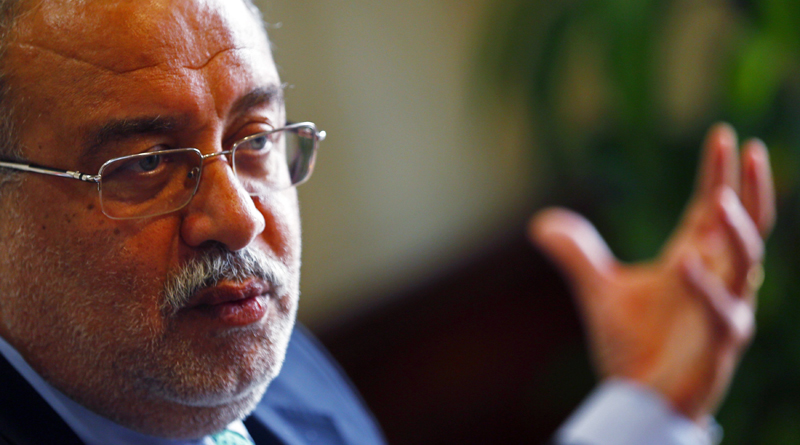Prime Minister Eng. Sherif Ismail chaired a general assembly meeting of the South Valley Holding Company for Petroleum and the Egyptian Holding Company for Petrochemicals to ratify the outcome of fiscal year 2014/2015, in the presence of Aswan Governor Major Gen. Mostafa Youssri, Qena Governor Major Gen. Abdel Hamid el Haggan, Petroleum Undersecretary Dr. Sherif Sousa, CEO of the Petroleum Authority Eng. Tarek el Molla, First Undersecretary at the Central Auditing Organisation Abdel Fattah Abdel Aziz and Head of the Petroleum Trade Union Mohamed Saafan and representatives of the ministries concerned.
Ismail underlined the importance of promoting research and exploration activities, increasing the local production and reserves of oil wealth and making best use of such natural wealth to increase the added value and enhance the national economy. Investment in projects of added value is an investment for the future, he said, adding that the petrochemical industry, with its current achievements, is one of the key evidences in this respect. He referred to several promising opportunities before serious investment, adding that the state is heading toward raising the living standards of the people in Upper Egypt, providing opportunities and increasing services offered to the citizens. This is obvious in increasing the rates of extending natural gas to homes and the establishing new fuel stations.
Geologist Abu Bakr Ibrahim, the head of South Valley Petroleum Holding Company, said the total value of the company’s agreements reached 27, including five new ones following the bid presented in 2014 with US, Malaysian, Canadian, British, UAE and Egyptian companies. One of these companies will enter the Egyptian market for the first time. The total expenditure will be at least $100.3 million and $3.7 million as a signing grant for drilling 16 new wells. He pointed out to a promising plan that aims at raising the rates of extending natural gas to housing units in Upper Egyptian governorates to reach 193,000 units this fiscal 2015/2016. The sugar and paper pulp factories in Edfu were operated with natural gas in December 2014, he added. As for diversifying the sources of energy, he said a memorandum of understanding has been signed with Enmaa Al Ain UAE Company to carry out economic studies to establish a package of new ventures to develop the Gulf of Suez area with investments amounting to around $3.5 billion. The projects will include an industrial zone and a harbor for importing clean coal. A joint committee has been formed with the Mineral Wealth Authority and the Ministry of Electricity to draw up a memorandum of understanding on using the underground energy in generating electricity and a study on using oil clay as well in this purpose in addition to a feasibility study to establish a power plant to operate with oil clay.
He added that the total production of oil companies supervised by the company amount to around 31,000 barrels of crude oil per day. The Assiut oil refinery has contributed to meeting the needs of Upper Egypt (from Assiut t Aswan and the New Valley) of oil products by 84.5 per cent. During this fiscal 2014/2015 a new fuel station of the Nile Company for Oil Distribution was operated, he said, pointing out that fuel stations currently stand at 53 and that 22 new ones are planned. The western road is being studied for the establishment of new fuel stations, he added.
Head of the Egyptian Holding Company for Petrochemicals Eng. Mohamed Saafan said the company’s new strategy includes several tracks represented in the completion of ongoing petrochemical projects to increase the added value and to make best use of their revenues to serve the Egyptian economy. The second axis is to develop standing petrochemical projects and improve and develop production units, such as the Egyptian Petrochemicals Company, he said.
He pointed out to the achievements reached during fiscal year 2014/2015, saying the company has contributed to the production of around 1.6 million tons of petrochemicals in a year. The production of the second line of MOPCO Factory has started with a production capacity of 650,000 tons annually. The third line is expected to be operated in October with a production capacity of 650,000 tons annually. The project of the Egyptian Company for Ethylene (Ethydco) will be out in December with a production capacity of 400,000 tons and investments reaching around $1.9 billion. A number of development projects have been implemented and obstacles at the Egyptian Petrochemicals Company have been eliminated and the production capacity of PVC has increased by 50 per cent, he said, adding that this has increase the annual revenues to EGP 240 million.
The third axis of the strategy is represented in projects of the future plan which is a complex for petrochemicals at the Suez Canal Axis that includes a complex for producing aromatics and olefins with investments reaching around $6 billion.
The company adopts the skills bank project which is the first and largest database of all workers at the petrochemicals sector that are constantly updated. The bank compiles and analyzes all future needs and plans for the future labour market and makes best use of cadres in addition to linking training and rehabilitation programmes with the promotion movement which enriches work at the petrochemicals sector, he added.


